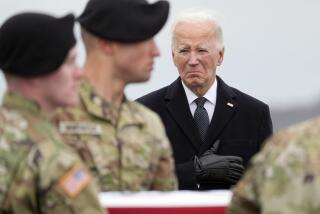Gulf War Dead to Receive Full Military Burials : Tributes: But U.S. bans rites at Dover Air Base. It says the servicemen would be best honored in their hometowns.
- Share via
NEW YORK — Military burial ceremonies will be offered to each soldier who is killed in action during Operation Desert Shield, military officials said Friday.
There have been questions raised by journalists, soldiers’ families and others in recent days about the plans for the dead since the Department of Defense announced that there will be no ceremonial services honoring the dead returning from the Middle East at Dover Air Force Base in Delaware.
Pentagon officials said also that there will be no media coverage of coffins returning to Dover.
“There won’t be any honor services at Dover, but there will be honor services for each and every person killed during Desert Storm, with the flag on the coffin and everything that the soldier is entitled to,” said Air Force Capt. Sam Grizzle, a Pentagon spokesman.
Bodies will be shipped from Dover--the military receiving point for troops killed in Desert Storm--to individual funeral services around the country.
“The best place to honor the dead is where their family and friends are,” said Grizzle. Families may hold private hometown services, with military honors provided, and there may be services at soldiers’ home bases, he added.
“There has been misapprehension (about Dover),” continued Grizzle, who said that the Pentagon had received calls about plans to honor America’s troops killed in action. “Dover is the transit point where the bodies come in. The caskets are transferred with dignity and respect, but the scene is somewhat clinical in nature. It’s not the place where we can best honor the dead.”
Regarding media coverage, Grizzle said: “Print and TV media will not be allowed in to take photographs of the caskets.”
There has been confusion in the press and among some soldiers’ families over the recently announced policy from the Department of Defense. Some have interpreted it to mean that there would be no military services.
Former President Ronald Reagan participated in several ceremonies honoring groups of servicemen killed together in combat or accidents during his Administration, including leading a service in 1983 for the 241 servicemen killed in a terrorist attack in Beirut that received national attention on TV and in print. But, although branches of the military from time to time have held military services for groups of servicemen killed together, particularly in a single, catastrophic event, there were no services for soldiers being returned to the United States during the Vietnam War, according to military officials.
During Operation Desert Shield, the bodies of 90 servicemen were processed through Dover, with ceremonies on two occasions, including a service for 10 soldiers killed in an accident aboard the ship Iwo Jima, said Capt. Chris Geisel, a spokesman at Dover. The decision to hold the ceremony was made by the U.S. Navy, he said.
Now that fighting has begun in the Gulf, the Pentagon has stated its policy against holding services at Dover.
Thursday night, KCBS-TV aired a commentary by anchorman Michael Tuck that began with news footage of a Southern California woman whose husband was among 11 Marines killed in the Gulf’s first ground battle. The woman said that she had “read in the paper today that these casualties are going to be treated lightly.” Her husband, she said, “is a hero--I don’t want his heroism downplayed.”
In a recent commentary on “NBC Nightly News,” John Chancellor referred to memorable services of flag-draped coffins at Dover. He argued that the Pentagon’s policy banning of cameras from Dover reduces “our knowledge of the true costs of war, and it robs us of a chance to grieve for the dead we never knew.”
After hearing of the apparent confusion over the extent of ceremonies and coverage at Dover, Chancellor said that he wouldn’t change his commentary, although he might return to the subject again.
But George Watson, Washington, D.C. bureau chief for ABC News, said he did not object to the restrictions at Dover.
“Among the complaints that we might have about Pentagon restrictions of news coverage, this is not a major one,” he said. “We want to show the face of war, but we don’t want to hang around ghoulishly at mortuaries. I can see how the military might not want to show the casualties. But I also think there’s a distinction between mass bodies returning and bodies coming home throughout the war. Continual services (at Dover) might be a burden on the families.”
More to Read
Sign up for Essential California
The most important California stories and recommendations in your inbox every morning.
You may occasionally receive promotional content from the Los Angeles Times.













